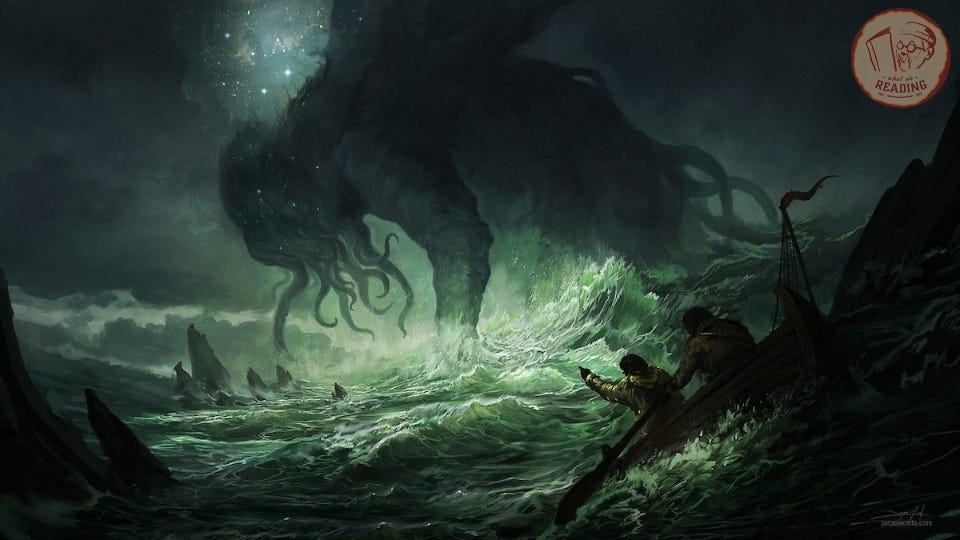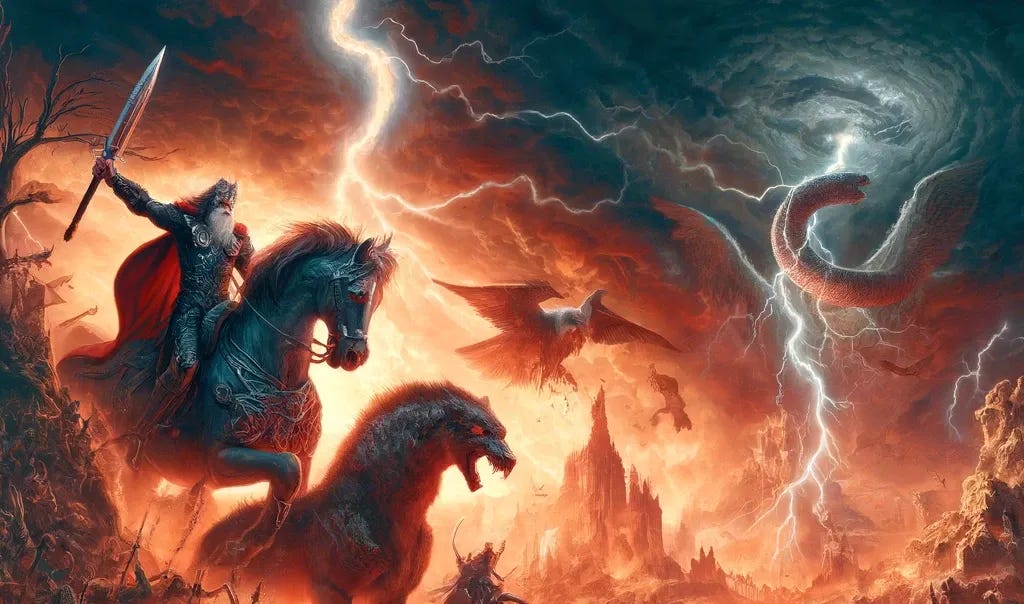Reconstructing Morality
A speculative piece on moral arbitration, Lovecraft and the agency of humans in the universe.
Emergence and the Individual
Emergence is a process of new qualities, arising out of quantity. Specifically, qualities that do not necessarily exist in a single individual, but do appear in the collective interaction of many individuals; one ant roams aimlessly, whilst a million ants build a sophisticated and complex nest. The emergent quality of a bee hive is clear: efficiency. The emergent quality of water is clear: adaptability. The emergent value of humanity can be both, or none of these things. What differentiates them is the ability of the mind to reflect, to stipulate the terms of emergent behaviour, through morality. Only, there is one huge caveat: humanity is in a constant struggle between the world of the collective and the world of the individual:
“Each person’s life – each lifeform, in fact – represents a world, a unique way in which the universe experiences itself.”
If all people became emotionless utilitarians - a swarm intelligence - no doubt they would transcend every standard of quality, at least when seen from above. They would embody intellect, unburdened by “petty” morality. Yet, they would be no different from ants or automata; an ant does not (as far as is understood) look upon its entire nest and celebrate that the project has been a success. By destroying the individuality amongst people, the most evaluating known species would be transformed, and no-one would remain to assess the emergent project of humanity as “good!”
How the Unknown Effects Morality
For the proceedings, the following premise will be assumed: for any outcome to be made intrinsically valuable in a metaphysical sense, a sufficiently intelligent and capable observer must deem it so. The function of an omnipresent and omnipotent god might be seen as such; an infinite observer, who can bestow value after humans return to dust and proclaim that none of the project was in vain. The ‘omni-’ prefix is probably the most salient power of some religions, exempting arguments for internal contradictions. No being, in this context, has the power to overthrow the god and then hold its own morality in higher esteem.
Howard Philip Lovecraft's works reflect this fear of a new moral authority and the defining trait of the genre he built, cosmic horror, is based on the fear that one is in the same position as the aforementioned ants. Lovecraft focuses heavily on the intrinsic horror of the unknown, but there are more subtle implications for morality. Just as people look upon tiny insects and judge them by their own values, another might appear from the cosmos and cast the same judgement over them. But by what metrics? If by practicality, one might be able to negotiate with an eldritch horror of these stories, asking for more years to divine a suitable moral system, or presenting it with well-preserved scripture. If, however, it judges people by the sophistication of their consciousness, the story could go rather differently. Just as one sees ants as not quite conscious enough for consideration, a higher consciousness being (literally or metaphysically) could judge humans by the same metric.
This strikes at a core idea. One dreads losing the ability to compete in the game of moral arbitration, or to be involved, yet woefully unaware of all or some of the rules. Even in the case of belief in the the dominion of a god or gods, the rules can be identified through stories and scriptures, through natural phenomena and dreams; one can take comfort that they are acting in accordance with a moral framework, even if they have not created it. The introduction of a new being, with its own unique perspective, complicates matters. It would encourage one to take a closer look at their own assumptions, down to the very fundamentals.
Morality, to be clear, is really the pursuit of ‘intrinsic value as expressed by agency’. Things without agency are amoral. For an example, when water arrives at a waterhole and nourishes animals, one identifies its adaptability as valuable, but they do not call it moral. Water has no agency. Likewise, a volcano erupts, destroying its surroundings, but no-one can call this an immoral act, for no agent has acted. Even where a divine agent has caused the eruption, the volcano becomes only a tool, an extension of the arm. Most modern people extend this amorality to the entire animal world (perhaps sometimes excepting for pets where the words “good” and “bad” are of frequent use). Animals seem to have some agency, but not enough to hold them accountable. If a person were mind controlled, most would also be willing to accept the victim of the control as amoral as well; after all, they have been robbed of agency. These are all relatively simple intuitions. Now consider that if someone has severe damage to the brain, people are far less likely to blame them, rather than the injury, for any proceeding behaviour, but the cracks begin to show. How about a genetic defect, or trauma? Once agency is viewed as a scale, the boundaries of clear (or non-arbitrary) moral culpability begins to break down.
Following this line of thinking, the complexity of morality in a boundless universe becomes clear. The less significant humans feel against the broader expanse, the less they will believe in their categorical separation from other animals and the more they will begin to see morality as agential (actors) rather than categorical (humans, animals, things). Further, the larger the universe, the more likely that there exists such creatures previously referred, of higher consciousness, intellect, and agency. Creatures which are less prone to vices and addictions, less participatory in self-deception, and more physically capable.
Facing the Abyss
Against such terrifying prospects that humans might not hold the key to objective morality, there is a tendency towards regression. To destroy the philosophy of millennia past and to employ cold rationality in deriving solutions.
The authoritarian, for example, cannot conceive of how humans might transcend the individual and achieve nation-wide, or even humanity-wide goals, without wrote emulation of what has been seen in nature. They conclude that the ends justify the means, that ants who live no life at all or are sacrificed for utility are an acceptable expense in a broader project. Just because other species function effectively as a collective, with little expression of the individual, it does not proceed that humans must become homogenized and mechanistic to achieve proportionately grandiose ambitions. Though in many ways humans are similar to other species, they are not the same. Just as a monkey is not the same as an elephant.
Humans can afford the short term inefficiencies of individual error, for it is offset by huge leaps which occur when unique minds are allowed to flourish. Not to mention that independence of mind seems to enrichen the human experience from a purely aesthetic view. These conditions for flourishing are not simply good nutrition, health, safety and a steady accumulation of shared knowledge, but sustainable moral practices. Progress must be anchored by the checks and balances of moral science, else it becomes self obsessed - Progress for the sake of progress - an objective which has already given birth to atom bombs, barbaric experiments, and now the more nefarious aspects of the digital age.
Unifying Principles in an Uncertain Time
As humans advance towards an age with less certainty in themselves as the only moral agents, and discover more about the universe, they will need to find new ways to orient their actions. The scale could tip too far, forcing people to become like ants (or machines), or completely break apart into nihilism. My opinion is that humans should take an active role in the study of morality as a science, not a self-referential and circular doctrine. Yet, they should insist that it be held to the standards of a true science, which purports itself to the evidence. And further, recognise that all claims of morality arise out of a goal, with the quality of that goal and the methodologies for reaching it, far more essential than the specificity of the conclusions drawn in its pursuit. Faced with novel, terrifying discoveries about the universe, religion strains to remain firm and to integrate such findings. Highly personified gods, such as those seen in Norse mythology might be forced to compete in a literal war against new findings, in a curious phenomena of religious power-creep. Meanwhile, the more vaguely defined ‘omni-’ type gods inevitably run into the threat of being logically disentangled. A science can instead evolve with the changing landscape, so long as it does not itself become dogmatic and sure of its own infallibility.
Many are terrified that a consistent… Neigh; Objective morality, cannot exist and thrive without asserting the existence of a metaphysical world. This may be true, but it is not necessarily as scary as one immediately supposes; most humans want their species to prosper, whatever form this might manifest in each individual’s imagination. This goal appears to be democratic in its purest form; the one axiomatic principle around which all other ideas can be oriented. Under this objective, such essential ideas as: one must not murder, nor steal, nor cheat, would still almost certainly be the correct means. Only, they would not derive correctness from some essential fact in the metaphysical realm, but by the result of studying psychology, behaviour, animals, history, religion and countless other relevant topics. This is not easy, but much of the groundwork has already been laid: I will discuss the ideas of moral reasoning which I find most promising in future writings.
The age in which humans now live is one which demands a rationale behind beliefs (well-reasoned or not). Many refuse to accommodate this demand and plea for others to let intuition or divinity retake the wheel. For better or worse, this seems no longer to be a reasonable expectation. Knowledge has everywhere been a tool of both liberation and constraint, depending on the manner of its use. Morality is not dissimilar in this respect. Now it must, and indeed is, assuming the form of a science in order to survive… One must vote on whether it will serve the human experience, or see everyone as ants.






